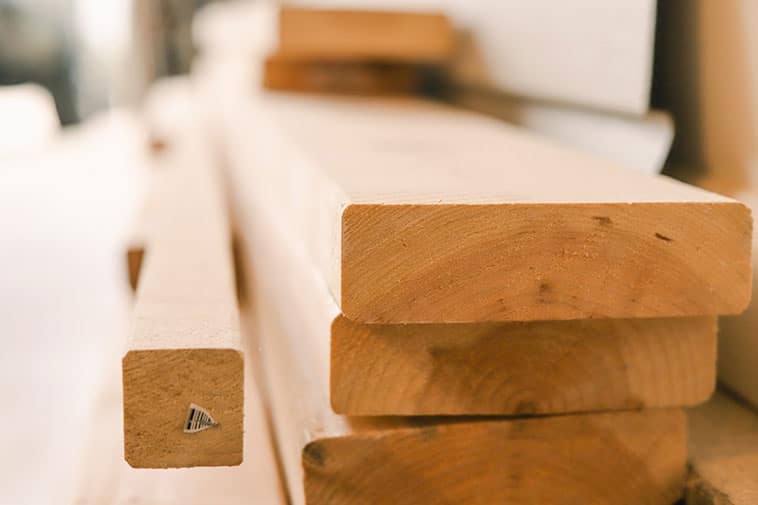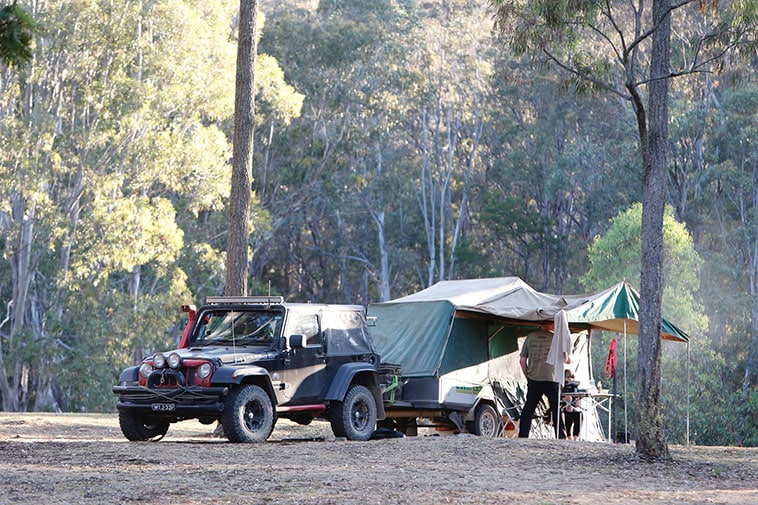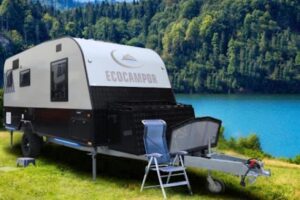Ensuring your trailer sits nice and level while you camp is extremely important. It will help to preserve some of the more expensive systems housed within your camper, and increase overall comfort in the trailer on the day to day.
Keep on reading to find out how to level a pop up camper, tips on saving a few bucks on expensive RV gear, and why it is important to strive for a level trailer if you want to protect your investment.
How to Level a Pop Up Camper
As long as you remember to start this process before unhitching your tow vehicle, leveling your pop up camper should be an easy task requiring minimal tools and effort.
What You’ll Need
- Chocks
- Leveling blocks
- Tow vehicle
- A spotter
Leveling Side to Side
Once you have found your ideal parking spot for your camper, your next step will be to unload your leveling blocks and grab your spotter for assistance.
It is not strictly necessary to have a second pair of eyes for this operation but it can make balancing your tires on the leveling blocks quite a bit easier. If you happen to end up in a bit of a tight campsite, the spotter can also watch the outside of the rig and make sure you don’t bump into anything.
Give your RV levels an eyeball and see how off-level you are side to side. Depending upon what the levels read, grab an appropriate number of leveling blocks and position them and your spotter on the low side of the camper. Reverse your camper just enough for the spotter to place the leveling blocks on the ground where the camper tire will rest.
Pull forward, letting the camper climb up onto the leveling blocks while watching your spotter for their signal to stop. Check your RV levels again. If the rig is still too low, repeat the process until your trailer is nice and level. If it is now too high, remove blocks one at a time until you are at your desired level.
Now check those wheels! Once you are done leveling side to side, immediately chock your wheels to prevent the uncontrolled movement of the trailer.
Money saving tip: If you don’t want to shell out the roughly $50 it takes to equip an RV with a sufficient amount of leveling blocks, use scrap wood instead. Scrap wood is more sustainable than plastic levelers and can be easily sourced from construction projects. Aside from affordability, wood blocks are handy because they often offer more variability in thickness than plastic blocks, allowing you more nuance and precision while leveling.

Does your RV have levels? If not, check out this article about installing RV levels on your camper.
Leveling Front to Back
Alright, so now your camper is nice and level side to side. Time to unhitch from your tow vehicle and level front to back.
Before unhitching, grab one last piece of scrap wood and place it underneath the tongue jack on your camper’s hitch assembly. After verifying that your wheel chocks are securely in place, lower the tongue jack (also known as a “drop-leg” in some regions) until it is supporting the weight of the trailer and the tongue has fully lifted off of the hitch. A scrap of wood will prevent the tongue jack from digging too deep into the soil.
Pull your tow vehicle out from under the tongue and park it.
Take a look at the RV level on the side of your pop up. They are typically located above the wheel of the camper, centered on the axle. Use the manual hand crank on the tongue jack to adjust the height of the front of your pop up until the camper is level.

Stabilize
At this point, your trailer should be adequately leveled side to side and front to back. Now it’s time to stabilize.
Lower your stabilizer jacks until they are touching the ground and supporting just a tiny amount of the trailer’s weight. Stabilizer jacks are made to stabilize not lift. Using stabilizers to invest substantial amounts of trailer weight can result in damage to the stabilizer jack and to your trailer’s frame.
No stabilizer jacks? No problem. Scrap wood blocks can be used in lieu of stabilizers. Just ensure the blocks are stacked well so they are not prone to collapsing as you move around your camper.
Only once your camper is level and stabilized should you raise the roof and pop open the slide outs.
There you have it! Now you know how to level a pop up camper, the gear you need to accomplish this, and some of the dos and don’ts of the process.
Check out this helpful video by YouTuber SSLFamilyDad if you would like some visual instruction as well.
Importance of a Level Trailer
Is it really that important to have your trailer level while camping? Yes it is, and here’s why:
- Fridge: There is potential to damage your trailer’s refrigerator if you run it while your camper is off-level. Many RV fridges use gravity to distribute cooling fluids throughout the appliance. When the appliance is run off-level, these fluids can struggle to flow properly and result in the cooling unit overheating.

- Holding Tanks: Most RV waste tanks use tank sensors to monitor and display how full each tank is. If sitting at an angle, these sensors will not read tank capacity accurately and may indicate your tank is more or less full than it actually is. This can turn into an unpleasant situation when grey or black water begins backflowing into your toilets and sinks.
- Comfort: I wouldn’t say I like sleeping at an angle, and I am very sensitive to my bed being off-level. For me, this is reason enough to strive for a nice level camper. A level trailer will also make opening and closing your RV’s door easier, and keep dishes and other items from sliding off the camper’s tables.
Travel Trailer Shopping?
Are you in the market for a pop up camper but not sure what to look for? Backcountry-capable tent trailers are becoming more popular every day. The off-road travel trailer manufacturer Ecocampor makes an awesome forward folding trailer. This adventure trailer is lightweight and compact for driving up those crazy 4×4 roads and unfolds into a backcountry palace once parked.
Frequently Asked Questions
What is a bubble level?
A bubble level is another term for an RV level. Some RVers use this term in reference to the movement of the bubble that displays how to level the RV.
What happens if a camper is not level?
Aside from the risks I mentioned above, you mainly risk frame damage and tire damage if your camper is lived in for a long time while being off-level.
What is a ball leveler?
A ball leveler is a mechanical device used for leveling an RV side to side without moving it. Bal levelers slip underneath the tire on the low side of the camper and use a screwing action to slowly lift that side of the camper.
Some RVers think they are unnecessary and a waste of money, some RVers absolutely love them. If you ever see your RV neighbor using one, feel free to wander over and ask their opinion on the matter.
Ready to Relax
Tow vehicle parked? Check. Camper is level? Check.
Now that you’re done driving vehicles and operating heavy equipment, feel free to set up a camp chair and crack open your favorite camping beverage. The “hard” work is done.
Remembering to properly level your pop up camper will help to protect the investment you made in your travel trailer and allow you to continue enjoying it for years to come. Happy camping!



